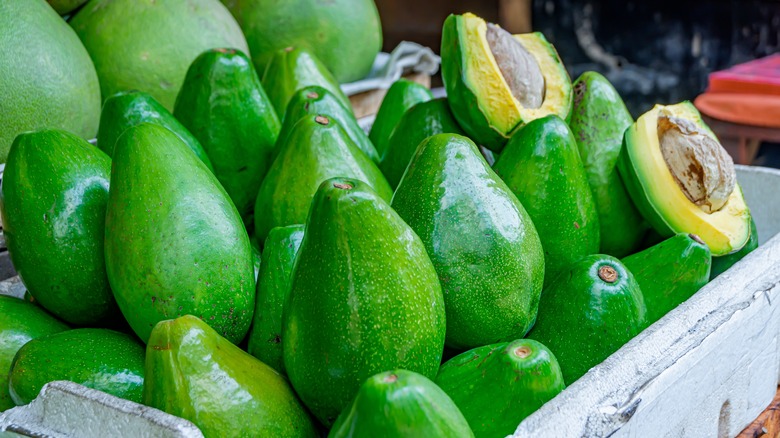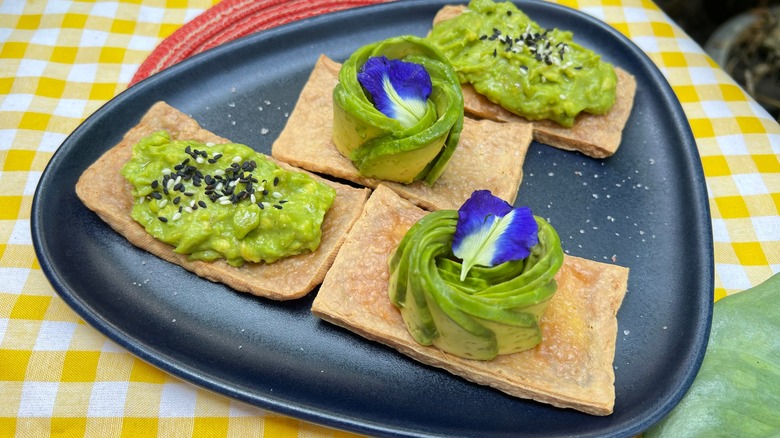Why You Should Up Your Avocado Consumption During The Winter
Avocado is praised as a superfood due to its content of healthy fats. A medium-sized fruit boasts over 19 grams of unsaturated fatty acids and 13 grams of carbs, including 10 grams of fiber, as reported by Harvard T.H. Chan School of Public Health. Plus, it's an excellent source of vitamin C, vitamin E, folate, potassium, and antioxidants. Oleic acid, one of the most abundant fats in avocados, can reduce bad cholesterol levels, protecting against heart disease. Dietary fiber, on the other hand, regulates blood sugar and may reduce diabetes risk.
This creamy fruit is good for your eyes, too. Lutein and zeaxanthin, two carotenoids in avocado, can protect your eyesight as you age, says Harvard T.H. Chan School of Public Health. Moreover, avocado consumption can help with weight loss despite its high calorie content, notes a recent review published in the journal Nutrients. As it turns out, the fruit may cause positive changes in the gut microbiota, making it easier to achieve a healthy weight.
The best part is, you can enjoy this fruit year-round and use it in countless recipes. Mix it into smoothies, spread it on toast, add it to salads, or serve it with eggs for a nutritional boost. That said, here's a surprising reason you should up your avocado consumption during the winter — and how to reap its benefits.
Fill up on avocado to nourish your skin in the winter
Cold weather can take a toll on your skin, causing dryness, flaking, or itchiness, and in some cases, it may worsen eczema and other skin disorders, warns Intermountain Healthcare. Creams and serums may help to some extent, but what you eat can make all the difference. Packed with healthy fats, vitamins, and minerals, avocado can help you fight dry skin in the winter and restore your glow. "Healthy fats are essential for keeping your face and hands looking healthy and preventing them from drying out in the cold winter months," said cosmetic physician Rekha Tailor in an interview with Byrdie.
Avocado consumption can also increase skin elasticity and firmness in as little as eight weeks, according to clinical research presented in the Journal of Cosmetic Dermatology. The monounsaturated fats, polyphenols, and other nutrients in this fruit may slow down aging and improve skin appearance, explain the study authors. Moreover, avocado is chock-full of vitamin C, a nutrient that promotes collagen synthesis. This compound also has antioxidant effects, protecting your skin from ultraviolet radiation, suggests a 2017 review featured in the journal Nutrients.
Vitamin E, another key nutrient in avocados, fights inflammation and guards your skin against oxidative damage. At the same time, it speeds up wound healing and may reduce the formation of wrinkles. This exotic fruit also contains vitamin A, a fat-soluble nutrient that helps prevent collagen breakdown and dry, itchy skin.
How to incorporate avocados into your diet
Get ready to say goodbye to dry, dull winter skin and achieve a radiant complexion! Eating an avocado every day might be exactly what you need to keep your skin healthy during the cold season. With its neutral flavor, this fruit goes well in both sweet and savory dishes, from brownies and muffins to casseroles. You can even add it to sushi rolls, homemade pizza, banana bread, or salad dressings.
Eat This, Not That! suggests using avocados in milkshakes, burgers, popsicles, puddings, or chocolate truffles. Alternatively, you can cut the fruit in half, add chili powder or other spices, and grill it for about five minutes. Another option is to swap butter for puréed avocado in your favorite recipes. If you don't like its taste or texture, mix the fruit with other ingredients to mask the flavor. For example, you could add puréed avocado to veggie chips, hummus, pancakes, waffles, or banana bread.
Ariana Cucuzza, a registered dietician, recommends consuming either half or a whole avocado daily (via the Cleveland Clinic). To fully reap the benefits, enjoy it as part of a balanced diet that also includes walnuts, almonds, seeds, olive oil, and other foods rich in healthy fats.



